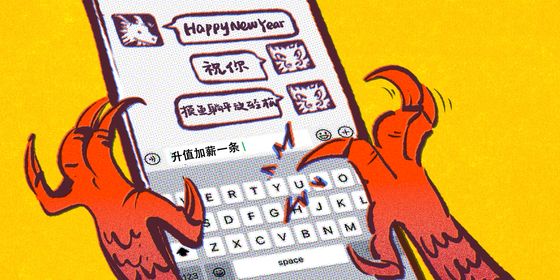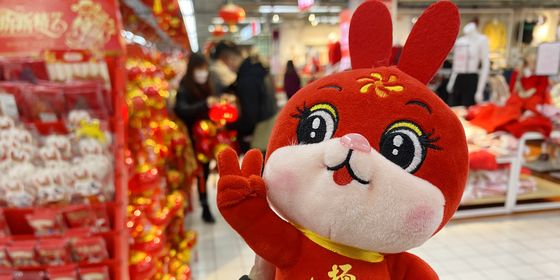Single dogs, lonely frogs, and other ways young Chinese singles creatively express loneliness, jealously, or even contentment online
Valentine’s Day isn’t just for couples anymore—at least, not the most recent edition that took place not long ago in China. The February 14 holiday witnessed not only certain young lovers sending each other 99 iPhones as gifts (as 九九 is a homophone of “everlasting,” or 久久 jiǔjiǔ) but also, for some reason, squads of young singles gathering together around trash cans waiting for what they termed a “harvest.”
Generally, on the day after Valentine’s Day, one can find trash cans in major shopping areas full of discarded bouquets that seemingly either served their purpose, or were rejected by their intended recipient. Expressing schadenfreude, some single netizens came up with a brilliant idea: What if they picked up those high-priced bouquets and sold them again at “zero cost and high returns (零成本高回报 líng chéngběn gāo huíbào)?”
More and more netizens joined in on the joke, writing about their post-Valentine’s “scavenger adventures (拾荒经历 shíhuāng jīnglì)” and declaring they’ve previously found cupcakes, snacks, lighters, and even cash folded in the shape of hearts hidden in the trashed bouquets. Others wonder, “Why is it that even the trash are receiving flowers (为什么连垃圾桶都能收到花 Wèi shénme lián lājītǒng dōu néng shōudào huā)?” while they stay single and giftless. They might declare, as they shamelessly bring home these discarded gifts, “I will collect everything that should belong to me on Valentine’s Day (情人节我将捡回属于我的一切 Qíngrénjié wǒ jiāng jiǎnhuí shǔyú wǒ de yíqiè)!”
This “Valentine’s scavengers” meme is just the latest of the slang that Chinese singles have used to describe or make fun of themselves. Faced with pressure to marry (催婚 cuīhūn) from their parents, and feeling “sour (酸 suān, jealous, sometimes represented by just a lemon emoji)” of couples in their circle of acquaintance, some single netizens cope by taking pride in their lack of a partner and reclaiming certain insults about their single status. Whereas they used to bewail themselves as a “single dog (单身狗 dānshēngǒu),” with “dog” being an unflattering description of a person in Chinese, they now claim to be “single nobles (单身贵族 dānshēn guìzú)” who have no partner or children to support, and thus have the time and money to live however they want.
Fed up with couples “showing off their love (秀恩爱 xiù ēn’ài)” on social media—an act also known as ”scattering dog food (撒狗粮 sǎ gǒuliáng)” to all the single dogs out there—these self-sufficient aristocrats might exclaim, “I want to become a single noble who works hard to make money and enjoy life (我要做个努力赚钱享受生活的单身贵族 Wǒ yào zuò gè nǔlì zhuànqián xiǎngshòu shēnghuó de dānshēn guìzú).” Those who’ve been unsuccessful in love might claim, “I had another breakup. I am an elite single noble. (又分手了,姐就是高贵的单身贵族。Yòu fēnshǒu le, jiě jiùshì gāoguì de dānshēn guìzú.)” They might also declare that "scattering dog food” is an act of animal abuse, or “mistreating single dogs (虐狗 nüègǒu),” and that pictures of expensive Valentine’s Day gifts or couples publicly displaying affection are “stinging their eyes (辣眼睛 là yǎnjīng).”
The less courteous “single dogs” might even jinx the couple: “Show off your love, and it will die soon (秀恩爱,死得快 xiù ēn’ài, sǐ de kuài),” alleging that couples who flaunt their love the most on social media are also the quickest to break up.
Apart from innocent dogs, frogs (青蛙 qīngwā) were also used to symbolize single people desperate for love, simply because the sound of their croaking (咕呱 gūguā) sounds like “孤寡 (gūguǎ, lonely).” On Xianyu, an app for trading secondhand goods, netizens even launched a service on Valentine’s Day and the Qixi Festival, the traditional Chinese festival for lovers, where one can send messages ribbing their single friends on their loneliness.
To purchase the service, one sends the vendor the recipient’s contact information on a messaging app. Someone with a profile picture showing Pepe the Frog, a political icon in the West that has been appropriated for various more innocent memes in China, will then add the recipient and send the message: “Hello, this is the Qixi Frog your friend has ordered for you. I will start croaking now: croak, croack, croak, croak. Wishing you loneliness forever this Qixi Festival. (您好,这是您朋友为您预定的七夕蛤蟆。现在我要开始叫了:孤寡孤寡孤寡孤寡。祝您七夕一直孤寡。Nín hǎo, zhè shì nín péngyou wèi nín yùdìng de Qīxī háma. Xiànzài wǒ yào kāishǐ jiào le: gūguǎ gūguǎ gūguǎ gūguǎ. Zhù nín Qīxī yìzhí gūguǎ.)”
Valentine’s Day may have now passed, but the Qixi Festival is on its way, as are the “520 Internet Valentine’s Day” and plenty more birthdays and anniversaries where couples can “buy, buy, buy” to display their love. But whether they see themselves as nobles, scavengers, or frogs, proud singles defend their right to have their own slang and traditions online—at least, until those also get turned into business opportunities by companies, like Singles Day.












